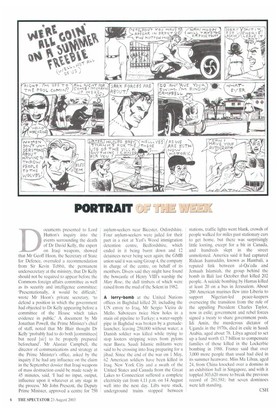D ocuments presented to Lord Hutton's inquiry into the events surrounding
the death of Dr David Kelly, the expert on Iraqi weapons, showed that Mr Geoff Hoon, the Secretary of State for Defence, overruled a recommendation from Sir Kevin Tebbit, the permanent undersecretary at the ministry, that Dr Kelly should not be required to appear before the Commons foreign affairs committee as well as its security and intelligence committee; Presentationally, it would be difficult,' wrote Mr Hoon's private secretary, 'to defend a position in which the government had objected to Dr Kelly appearing before a committee of the House which takes evidence in public.' A document by Mr Jonathan Powell, the Prime Minister's chief of staff, noted that Mr Blair thought Dr Kelly 'probably had to do both [committees] but need [sic] to be properly prepared beforehand'. Mr Alastair Campbell, the director of communications and strategy at the Prime Minister's office, asked by the inquiry if he had any influence on the claim in the September dossier that Iraqi weapons of mass destruction could be made ready in 45 minutes, said, 'I had no input, output, influence upon it whatever at any stage in the process.' Mr John Prescott, the Deputy Prime Minister, approved a centre for 750 asylum-seekers near Bicester, Oxfordshire. Four asylum-seekers were jailed for their part in a riot at Yarl's Wood immigration detention centre, Bedfordshire, which ended in it being burnt down and 12 detainees never being seen again; the GMB union said it was suing Group 4, the company in charge of the centre, on behalf of its members. Divers said they might have found the bowcastie of Henry VIII's warship the Mary Rose, the dull timbers of which were raised from the mud of the Solent in 1982.
A lorry-bomb at the United Nations offices in Baghdad killed 20, including the UN envoy to Iraq, Mr Sergio Vieira de Mello. Saboteurs twice blew holes in a main oil pipeline to Turkey; a water-supply pipe in Baghdad was broken by a grenadelauncher, leaving 250,000 without water; a Danish soldier was killed while trying to stop looters stripping wires from pylons near Basra. Saudi Islamic militants were said to be crossing into Iraq preparing for a jihad. Since the end of the war on I May, 62 American soldiers have been killed in Iraq. New York City and a swath of the United States and Canada from the Great Lakes to Connecticut suffered a complete electricity cut from 4.11 p.m. on 14 August well into the next day. Lifts were stuck, underground trains stopped between stations, traffic lights went blank, crowds of people walked for miles past stationary cars to get home, but there was surprisingly little looting, except for a bit in Canada, and hundreds slept in the street unmolested. America said it had captured Riduan Isamuddin, known as Hambali, a reputed link between al-Qa'eda and Jemaah Islamiah. the group behind the bomb in Bali last October that killed 202 people. A suicide bombing by Hamas killed at least 20 on a bus in Jerusalem. About 200 American marines flew into Liberia to support Nigerian-led peace-keepers overseeing the transition from the rule of the appalling President Charles Taylor, now in exile; government and rebel forces signed a treaty to share government posts. Idi Amin, the murderous dictator of Uganda in the 1970s, died in exile in Saudi Arabia, aged about 78. Libya agreed to set up a fund worth £1.7 billion to compensate families of those killed in the Lockerbie bombing in 1988. France said that over 3,000 more people than usual had died in its summer heatwave. Miss Ma Lihua, aged 24, from China knocked over a domino in an exhibition hail in Singapore, and with it toppled 303,620 more to break the previous record of 281,581: but seven dominoes were left standing.


























































 Previous page
Previous page